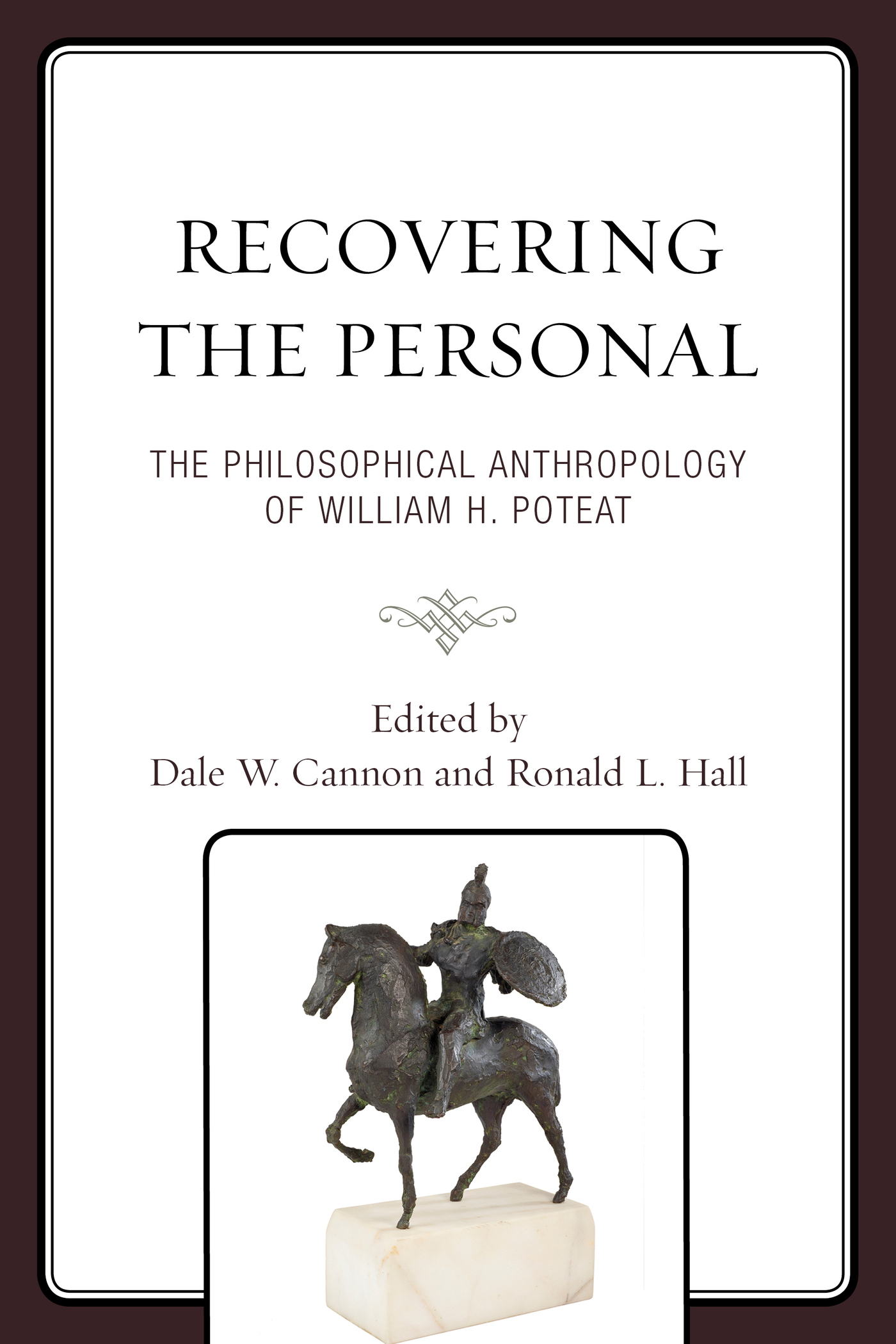Recovering the Personal
Recovering the Personal
The Philosophical Anthropology of William H. Poteat
Edited by Dale W. Cannon and
Ronald L. Hall
LEXINGTON BOOKS
Lanham Boulder New York London
Published by Lexington Books
An imprint of The Rowman & Littlefield Publishing Group, Inc.
4501 Forbes Boulevard, Suite 200, Lanham, Maryland 20706
www.rowman.com
Unit A, Whitacre Mews, 26-34 Stannary Street, London SE11 4AB
Copyright 2016 by Lexington Books
All rights reserved. No part of this book may be reproduced in any form or by any electronic or mechanical means, including information storage and retrieval systems, without written permission from the publisher, except by a reviewer who may quote passages in a review.
British Library Cataloguing in Publication Information Available
Library of Congress Cataloging-in-Publication Data Available
ISBN 978-1-4985-4094-0 (cloth : alk. paper)
ISBN 978-1-4985-4095-7 (electronic)
 TM The paper used in this publication meets the minimum requirements of American National Standard for Information Sciences Permanence of Paper for Printed Library Materials, ANSI/NISO Z39.48-1992.
TM The paper used in this publication meets the minimum requirements of American National Standard for Information Sciences Permanence of Paper for Printed Library Materials, ANSI/NISO Z39.48-1992.
Printed in the United States of America
Acknowledgments
This collection owes much to Yale University Divinity School and to Walter B. Mead for establishing a research archive at the Divinity School Library devoted to the work of one of its former students, William H. Poteat, whose philosophical career is the subject of this volume. An informal group of Poteats former students decided to celebrate this new research archive by convening a conference devoted to Poteats intellectual legacy. A great thanks is due Dale W. Cannon, James Clement Van Pelt, and Walter B. Mead for organizing this conference. It was entitled, The Primacy of Persons: The Intellectual Legacy of William H. Poteat and was held at Yale June 68, 2014.
This conference brought together many former students and admirers of Poteats work. Great thanks is due to all of these participants in the conference, not only for the papers they presented and the spirited discussions that followed, but for the welcomed opportunity to renew acquaintances from our common past. The spirit of the conference recalled the conviviality of our days with each other and with Bill Poteat. A selection of some of these papers, along with some additional ones, is included in this volume.
A special word of thanks goes to Patricia Poteat, widow of Professor Poteat, for giving us permission to include a previously unpublished paper by Professor Poteat on the work of Paul Czanne. We would also like to thank her for arranging to have a photographer capture a prized sculpture, Alexander on Horseback, by Greek sculptor and close friend of Poteat, Evangelos Moustakas, that is featured on the cover.
Part I
Philosophical Anthropology
Chapter 1
Refinding the Personal
Dale W. Cannon and Ronald L. Hall
William H. Poteat (April 19, 1919May 17, 2000) was a philosopher, scholar, and charismatic professor of philosophy, religion, and culture at the University of North Carolina at Chapel Hill from 1947 to 1957 and at Duke University from 1960 to 1987. In these years, he built an acclaimed reputation as an excellent and engaging teacher but also as an extraordinarily gifted intellectual. This combination produced a deep and lasting impression on both his students and colleagues. As a teacher, he sensed and was able to address the pervasive and profound alienation that he knew his students were feeling. But more importantly, he was also able to provide them with intellectual resources for understanding the roots of their alienation and hope for overcoming it. He traced these roots to the dualistic premises of what he called critical philosophy. For him, critical philosophy, defined by Descartes and refined by Kant, bequeathed to modern Western culture an abstract picture of the objectified natural world within which persons had no essential place and a corresponding abstract picture of the consciously aware person as essentially disembodied and as such alienated from that world, from others, and from themselves.
Throughout his career, in his writings and in the classroom, Poteat successfully managed to uncover, expose, and profoundly redress the alienating dualistic premises of critical philosophy. He knew full well that these premises were undermining personal existence. But he not only pressed this radical critique of dualism, he also managed to articulate a post-critical philosophical anthropology that promised to provide a path for the recovery of the personal.
As a teacher, Professor Poteat was a master dialectician. He was uncommonly skilled in the use of irony in understanding and elucidating conflicting points of view and in drawing out and bringing to the surface, for reflective awareness and critique, otherwise unacknowledged dualistic presuppositions (sometimes unconscious) that remain tacitly operative in our thinking. At every turn, he worked against the grain of modernitys distrust, suspicion, and denial of personal judgment and contended to the contrary that personal judgment is a reliable, essential element in all forms of inquiry. Poteat brought to light how this ubiquitous attitude of doubt carries with it a captivating and distorting picture of the person as a critical and disembodied reflective thinker. Such a picture of the person as abstracted from the world in pursuit of a view from nowhere, systematically represses and excludes from consideration pre-reflective aspects of ourselves as embodied persons and radically undermines the fate of personal existence. Poteat understood this in a profound way and opposed such a picture of persons.
Poteat saw himself as seeking to bring about a shift to a new and different paradigm of thought, what he came to call post-critical thinking. He adopted and embraced the term post-critical from the subtitle of the scientist-philosopher Michael Polanyis major work, Personal Knowledge: Towards a Post-Critical Philosophy. What Poteat liked about this idea of post-critical thinking was that it symbolized opposition to the grain of the dualism of critical philosophy and promised recovery of the person and the personal. Although Poteat adopted Polanyis term post-critical, he found this kind of thinking incipiently present in a number of other of his mentors as well. These include Soren Kierkegaard, Hannah Arendt, Ludwig Wittgenstein (later works), and Maurice Merleau-Ponty. It also includes, as Poteat himself explains and demonstrates in the last chapter in this volume, the post-critical philosophical research and discoveries of the painter Paul Czanne.
Michael Polanyi conceived of his own philosophical work as a matter of epistemology through critiquing and displacing the dominant, largely positivist misconception of modern science. However, Poteat early on recognized that the root problem of modern critical thought was philosophically deeper than epistemology. Accordingly, he refocused his project on ontology and specifically on a misconception of the being of the thinker, the knower, the person. And even though Polanyi had caught sight of this, he did not manage to plumb its depths or to develop a full-blown post-critical anthropology. It was left for Poteat to dig deeper and, as he would finally put it, to recover the ontological ground of personal existence. And this he succeeded in doing. Indeed, we think this success was his finest achievement. His last philosophical essay, Paul Czanne and the Numinous Power of the Real, unpublished until this volume, affords the reader a partial glimpse into the revolutionary character of Poteats philosophical work.
Next page
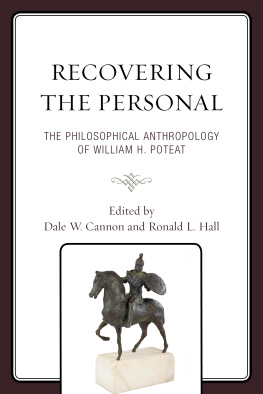

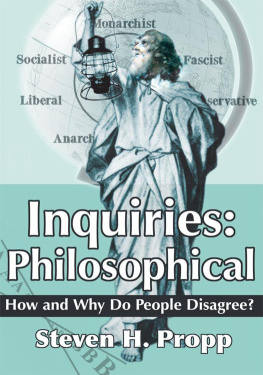
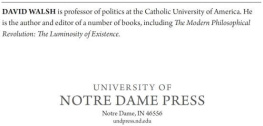
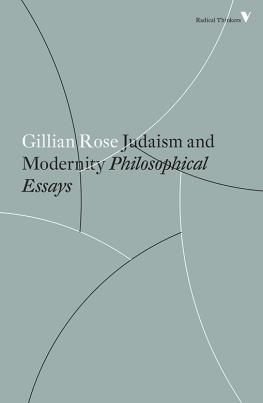
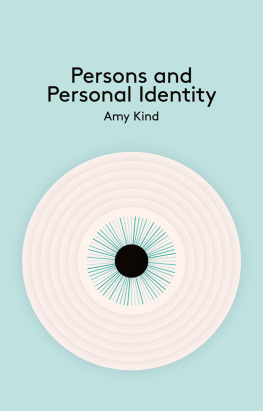
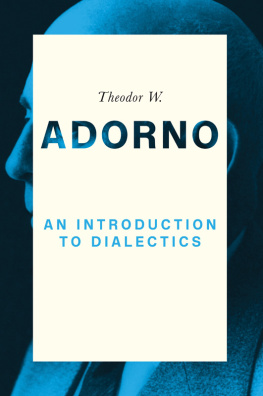
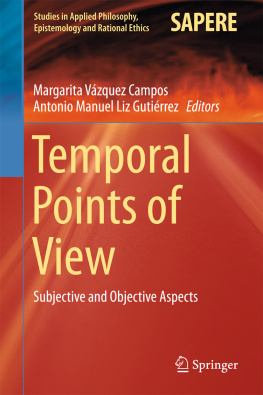
 TM The paper used in this publication meets the minimum requirements of American National Standard for Information Sciences Permanence of Paper for Printed Library Materials, ANSI/NISO Z39.48-1992.
TM The paper used in this publication meets the minimum requirements of American National Standard for Information Sciences Permanence of Paper for Printed Library Materials, ANSI/NISO Z39.48-1992.